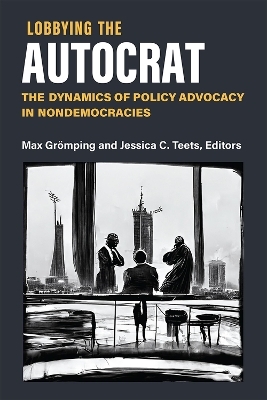
Lobbying the Autocrat
The University of Michigan Press (Verlag)
978-0-472-05590-6 (ISBN)
- Lieferbar (Termin unbekannt)
- Versandkostenfrei innerhalb Deutschlands
- Auch auf Rechnung
- Verfügbarkeit in der Filiale vor Ort prüfen
- Artikel merken
Although authoritarian countries often repress independent citizen activity, lobbying by civil society organizations is actually a widespread phenomenon. Using case studies such as China, Russia, Belarus, Cambodia, Malaysia, Montenegro, Turkey, and Zimbabwe, Lobbying the Autocrat shows that citizen advocacy organizations carve out niches in the authoritarian policy process, even influencing policy outcomes. The cases cover a range of autocratic regime types (one-party, multi-party, personalist) on different continents, and encompass different systems of government to explore citizen advocacy ranging from issues such as social welfare, women’s rights, election reform, environmental protection, and land rights. They show how civil society has developed adaptive capacities to the changing levels of political repression and built resilience through ‘tactful contention’ strategies. Thus, within the bounds set by the authoritarian regimes, adaptive lobbying may still bring about localized responsiveness and representation.However, the challenging conditions of authoritarian advocacy systems identified throughout this volume present challenges for both advocates and autocrats alike. The former are pushed by an environment of constant threat and uncertainty into a precarious dance with the dictator: just the right amount of acquiescence and assertiveness, private persuasion and public pressure, and the flexibility to change quickly to suit different situations. An adaptive lobbyist survives and may even thrive in such conditions, while others often face dire consequences. For the autocrat on the other hand, the more they stifle the associational sphere in an effort to prevent mass mobilization, the less they will reap the informational benefits associated with it. This volume synthesizes the findings of the comparative cases to build a framework for understanding how civil society effectively lobbies inside authoritarian countries.
Max GrÖmping is Senior Lecturer in the School of Government and International Relations at Griffith University. Jessica C. Teets is Professor in the Political Science Department at Middlebury College.
List of Figures
List of Tables
Acknowledgements
I. Introduction
1. Max Grömping and Jessica C. Teets – Lobbying the Autocrat: A Theoretical Roadmap
II. Mobilization and maintenance
2. Marcel Hanegraaff and Iskander de Bruycker - The Lobbying Demands of Autocratic and Democratic Leaders: A Comparative Perspective
3. Sanja Hajdinjak - Between Pressure and Patronage: Navigating Legitimacy and No-Go Issues in Montenegro
III. Interest communities
4. Reza Hasmath – Convergence and Divergence in Policy Topics amongst Think Tanks in China
5. Sokphea Young - Transnational Activism under Autocracy: Environmental Advocacy Groups, Social Media, and Nationalism in Cambodia
6. Bilge Yabanci – Acts of Compliance and Tactful Contention: The Polarized Terrain of Women’s Organizations in Turkey under Authoritarian Pressure
IV. Strategies
7. Max Grömping – Going Public: When do Human Rights Advocates pursue Media Strategies?
8. Hui Li - Political Resources and NGO Policy Advocacy Strategies in China
9. Ying Hooi Khoo and Carmen Leong – Policy Advocacy Strategies of Malaysia’s Electoral Reform Movement
V. Outcomes
10. Eleanor Bindman and Tatsiana Chulitskaya - Post-Soviet Policy Entrepreneurs? The Impact of Non-State Actors on Social Service Reform in Russia and Belarus
11. Kirk Helliker, Sandra Bhatasara and Manase Kudzai Chiweshe – Land Lobbying and Mobilization: Civil and Uncivil Society in the 1990s in Zimbabwe
12. Angelo Vito Panaro – Delivering on Legitimation Claims: Creating Consultative Mechanisms for CSOs in Authoritarian Regimes
VI. Conclusion
13. Max Grömping and Jessica C. Teets – Toward a Theory of Lobbying under Authoritarianism
Appendix A – Supplementary Materials for Chapter 3
Appendix B – Supplementary Materials for Chapter 6
Appendix C – Supplementary Materials for Chapter 7
Contributors
Index
| Erscheinungsdatum | 20.07.2023 |
|---|---|
| Reihe/Serie | Weiser Center for Emerging Democracies |
| Zusatzinfo | 17 figures, 20 tables |
| Verlagsort | Ann Arbor |
| Sprache | englisch |
| Maße | 152 x 229 mm |
| Gewicht | 272 g |
| Themenwelt | Recht / Steuern ► Allgemeines / Lexika |
| Recht / Steuern ► EU / Internationales Recht | |
| Sozialwissenschaften ► Politik / Verwaltung ► Politische Systeme | |
| Sozialwissenschaften ► Politik / Verwaltung ► Vergleichende Politikwissenschaften | |
| ISBN-10 | 0-472-05590-9 / 0472055909 |
| ISBN-13 | 978-0-472-05590-6 / 9780472055906 |
| Zustand | Neuware |
| Haben Sie eine Frage zum Produkt? |
aus dem Bereich


